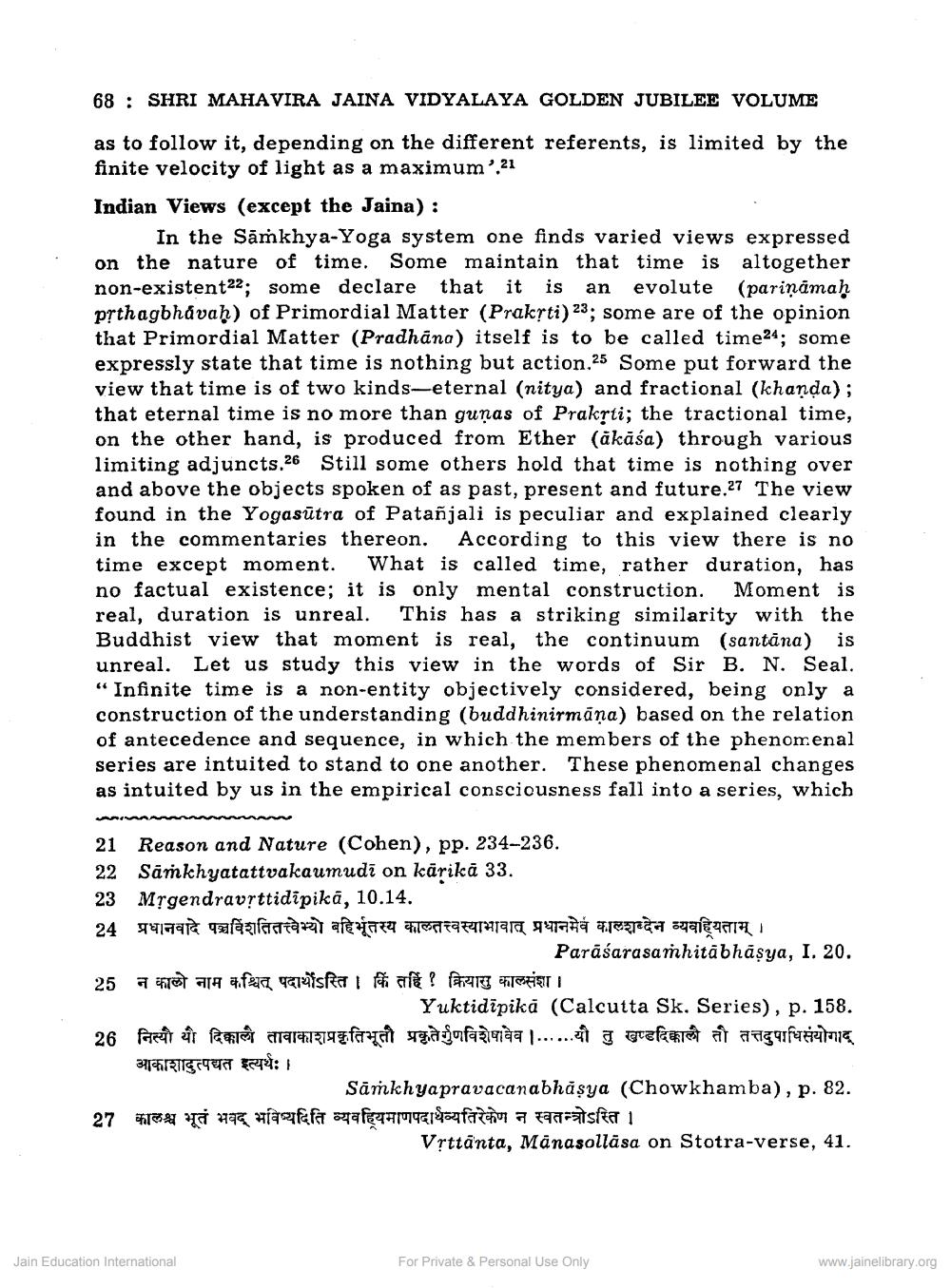Book Title: Nature of Time Author(s): Nagin J Shah Publisher: Z_Mahavir_Jain_Vidyalay_Suvarna_Mahotsav_Granth_Part_1_012002.pdf and Mahavir_Jain_Vidyalay_Suvarna_ View full book textPage 6
________________ 68 : SHRI MAHAVIRA JAINA VIDYALAYA GOLDEN JUBILEE VOLUME as to follow it, depending on the different referents, is limited by the finite velocity of light as a maximum'.21 Indian Views (except the Jaina): In the Samkhya-Yoga system one finds varied views expressed on the nature of time. Some maintain that time is altogether non-existent22; some declare that it is an evolute (pariņāmaḥ prthagbhåvah) of Primordial Matter (Prakrti) 23; some are of the opinion that Primordial Matter (Pradhana) itself is to be called time24; some expressly state that time is nothing but action.25 Some put forward the view that time is of two kinds-eternal (nitya) and fractional (khanda); that eternal time is no more than guņas of Prakrti; the tractional time, on the other hand, is produced from Ether (akāśa) through various limiting adjuncts.26 Still some others hold that time is nothing over and above the objects spoken of as past, present and future.27 The view found in the Yogasūtra of Patañjali is peculiar and explained clearly in the commentaries thereon. According to this view there is no time except moment. What is called time, rather duration, has no factual existence; it is only mental construction. Moment is real, duration is unreal. This has a striking similarity with the Buddhist view that moment is real, the continuum (santāna) is unreal. Let us study this view in the words of Sir B. N. Seal. "Infinite time is a non-entity objectively considered, being only a construction of the understanding (buddhinirmāņa) based on the relation of antecedence and sequence, in which the members of the phenomenal series are intuited to stand to one another. These phenomenal changes as intuited by us in the empirical consciousness fall into a series, which 21 Reason and Nature (Cohen), pp. 234-236. 22 Samkhyatattvakaumudi on kārikā 33. 23 Mrgendravsttidipikā, 10.14. 24 प्रधानवादे पञ्चविंशतितत्त्वेभ्यो बहिर्भूतस्य कालतत्त्वस्याभावात् प्रधानमेवं कालशब्देन व्यवहियताम् । Parāśarasaṁhitābhāsya, I. 20. 25 न कालो नाम कश्चित् पदार्थोऽस्ति । किं तर्हि ? क्रियासु कालसंज्ञा । Yuktidipikā (Calcutta Sk. Series), p. 158. 26 नित्यौ यो दिक्काली तावाकाशप्रकृतिभूती प्रकृतेर्गुणविशेषावेव ।......यौ तु खण्डदिक्कालौ तौ तत्तदुपाधिसंयोगाद् आकाशादुत्पद्यत इत्यर्थः। Samkhyapravacanabhāsya (Chowkhamba), p. 82. 27 कालश्च भूतं भवद् भविष्यदिति व्यवहियमाणपदार्थव्यतिरेकेण न स्वतन्त्रोऽस्ति । Vrttanta, Mänasolläsa on Stotra-verse, 41. Jain Education International For Private & Personal Use Only www.jainelibrary.orgPage Navigation
1 ... 4 5 6 7 8 9 10 11 12 13 14 15 16 17 18 19 20 21 22 23 24 25
